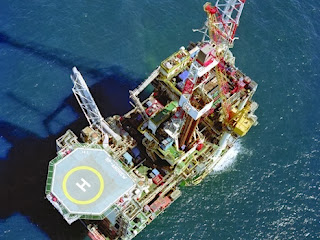How can I find the best position on gas & oil rigs for me?
You'd better consider what your intentions for the future are before applying for a job on offshore oil and gas rigs. Working on offshore platforms is not an easy profession and you should consider whether hands-on practical work offshore in a rational position is the best choice for you.
- Before you apply for a job on oil & gas rigs, write down all your strengths, skills and interests on a piece of paper - once you choose the position you are mostly interested in, send one application for the right position instead of sending many applications for the wrong positions.
Have this in mind: Experience matters!
 Offshore Gas & Oil rig companies have ever valued people with all type of trade and mechanical engineering qualifications and this would probably continue be the case. But, positions on gas and oil rigs are often quickly filled by people who already have experience on similar positions on rig platforms. If this is going to be your first time on an offshore rig platform and you don't have any previous experience on a rig, then you can demonstrate your commitment and willingness to offshore work by applying for a roustabout position, which is the entry-level offshore oil rig job.
Offshore Gas & Oil rig companies have ever valued people with all type of trade and mechanical engineering qualifications and this would probably continue be the case. But, positions on gas and oil rigs are often quickly filled by people who already have experience on similar positions on rig platforms. If this is going to be your first time on an offshore rig platform and you don't have any previous experience on a rig, then you can demonstrate your commitment and willingness to offshore work by applying for a roustabout position, which is the entry-level offshore oil rig job.One other thing you should consider is being aware of the daily life on offshore rigs, so that you can be in a better position to be a driller.
But, how do I get offshore experience when no one will hire me without any experience on gas & oil rigs?
HR companies are frequently asked this question because entry-level positions on gas & oil rigs are very competitive.
You've got a trade background and no experience on offshore rigs - then you'd better apply for a service company first and as soon as you gain some experience you will be more likely to be hired for a rational gas or oil rig position.
What is a service company?
Offshore gas & oil rigs have different types of technical equipment, which regularly needs repair and maintenance. Some of the maintenance and repairing operations are carried out by rig workers, but if they are unable to fix the problem, then the offshore service provider will.
Working with service companies within your trade, you are quickly going to gain very relevant offshore experience flying out to drilling rigs all over the world, repairing their technical equipment.
Leverage your education and experience on offshore drilling rigs?
If you've completed a degree in engineering, or if you've got leadership experience, then you might be a good fir for an acceleration program. Successful completion of such a program will secure you a challenging on or offshore drilling rig position.
Before you apply for an offshore gas & oil drilling rig, make sure you choose the most appropriate program in accordance with your experience and interests.
Any other tips when applying for an offshore oil rig job?
- Make sure that you apply for the right position for you - it's not very recommended to apply for every available gas & oil rig job, especially if the positions are offered by one company.
- Pay some attention to make a good CV and clearly state your contact details, certifications and any other experience, which might be relevant. List your past positions, with names of the companies you've worked for, dates, and detailed description of what you did.
- If you are invited to an interview for a drilling job, come prepared!
- Do a research into the position you are applying for and the company, as well. Make sure you understand the company, the desired path of your career, and how this offshore gas & oil rig job will fit you.
- Make a search on the web about standard questions on job interviews, such as why you want to work for the company, and what your strengths and weaknesses are. Make a list of questions you would be interested to ask for and remember them.
- You should also be able to describe yourself, because you are very likely to be asked - an offshore gas & oil rig job interview is about getting to know each other!
More relevant articles:
How to Become an Offshore Oil Rig Worker – 5 Tips to Get Hired Fast
No Experience : Is an Offshore Oil Rig Job Right For You?
How to work on offshore oil rigs?




































